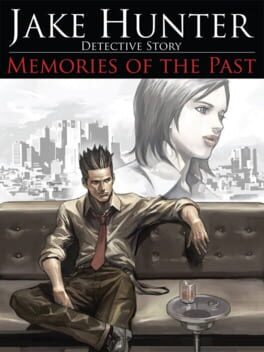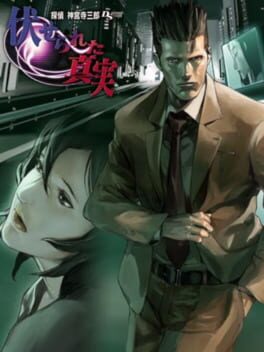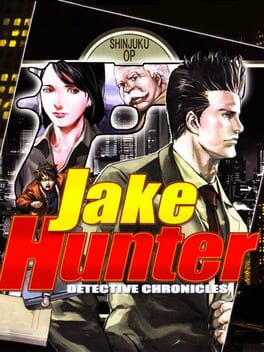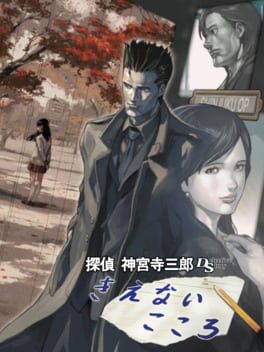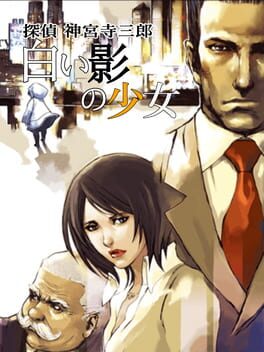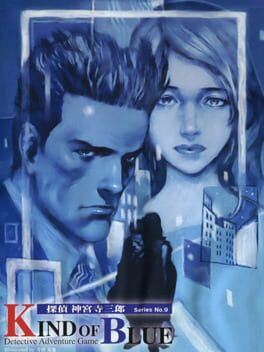

Jake Hunter: Detective Story - Memories of the Past
released on Jul 19, 2007
An expanded game of Jake Hunter: Detective Chronicles
Jake Hunter Detective Story: Memories of the Past is not simply a remake of Jake Hunter: Detective Chronicles. The three cases in that game have been re-localized. Three new cases have been added, one of which was made exclusively for Nintendo DS. There is also a new mode in Jake Hunter Detective Story: Memories of the Past called Jake Hunter Unleashed. These are comedic stories done in a completely different style. Finally, more passwords can be found to unlock short stories and interviews with the developers.
Also in series
Reviews View More
All I knew about this one was how much of a mess the original release was, so I was pleasantly surprised that the mysteries were actually pretty solid. My favourite was case 4 (where you get to play as Yoko/Yulia). The main cases are in a noir/realistic crime drama mode, while the "Unleashed" cases are more like five-minute mysteries.
Mechanically, there is some retro clunk, but having played plenty of menu-based adventure games, this didn't bother me. I don't have a comparison point for the original 80s games, but just based on this remake I felt like you could see some of the tone/style of this series in later detective games, moreso than e.g. Famicom Detective Club.
This is the "fixed" translation, which is hammier than a pulled pork stand at the State Fair (great). It's still aggressively Americanized (not great). This led to some bonkers moments such as a plot beat that relied on the map of the Tokyo Metro--or rather, the Aspicio subway system. Except since these are now fictional locations, the deduction turns into pointless, hard-to-follow process of elimination. Also there's a tendency to abbrv wrds to fit on the bttns, which occasionally makes deductions difficult. But you can't really fail, so.
Anyway, overall I enjoyed it a lot, and I'm glad I played it, though between the heavy localization, numerous typos, and at least one bug, I'm still rating it a 3 rather than a 4.
Mechanically, there is some retro clunk, but having played plenty of menu-based adventure games, this didn't bother me. I don't have a comparison point for the original 80s games, but just based on this remake I felt like you could see some of the tone/style of this series in later detective games, moreso than e.g. Famicom Detective Club.
This is the "fixed" translation, which is hammier than a pulled pork stand at the State Fair (great). It's still aggressively Americanized (not great). This led to some bonkers moments such as a plot beat that relied on the map of the Tokyo Metro--or rather, the Aspicio subway system. Except since these are now fictional locations, the deduction turns into pointless, hard-to-follow process of elimination. Also there's a tendency to abbrv wrds to fit on the bttns, which occasionally makes deductions difficult. But you can't really fail, so.
Anyway, overall I enjoyed it a lot, and I'm glad I played it, though between the heavy localization, numerous typos, and at least one bug, I'm still rating it a 3 rather than a 4.
The translation is rather stilted at times, you can practically play it with your brain on autopilot (aside from the quizzes they occasionally throw at you), and it's clear that they haven't done much, visuals aside, to update these decades-old adventure games. But the cast still grew on us, so we can't quite say that we had a bad time.
great collection of several fun detective romps and brainteasers with cool and fun atmosphere. it has a clearly lower budget than some its mystery adventure contemporaries, but it's smartly used and packs a good variety of content and quality presentation to make it worth your time.
the main story within is an original scenario written for the DS game that stitches together the first 5 sub-scenarios of the then-current Jinguuji Saburou feature phone "novel" series, hence the subtitle. the first 4 are reinterpretations of the original Famicom adventure games with wildly different stories (though the 4th is quite faithful), and the remaining 5th is the first original story for this mobile series. the connections to all these stories are pretty loose, but the way they're utilised in the main scenario is still a much more fun way to include them than simply listing them all in the main menu (though it does do that as well...)
the rest of the game is made up of goofy mini-stories stuffed with branches and gags to look out for, while also letting you solve the mystery yourself instead of following the linear novel structure of the main game.
the writing (both in the original Japanese and in translation) is presented as a sincere homage to classic detective noir fiction, as is the atmosphere referred to earlier. characters are a balanced bunch of quirks and vices, and the scenarios are layered in such a way that makes the journey of discovering the truth behind each mystery an immediately appealing one. there aren't any absurd antics, subversions or unhinged philosophy rants to be found here but that doesn't make it a boring story, does it?
a great comparison I read is that playing these games is like watching an episode of your favourite TV drama series. you're not about to have your mind blown by any particular piece of writing, but the overall experience makes it comforting and still memorable.
also the jazz MIDI music kicks ass. seiichi hamada's one of the few staffers who's been with the series since the very beginning in the late 80s and he's still going.
the main story within is an original scenario written for the DS game that stitches together the first 5 sub-scenarios of the then-current Jinguuji Saburou feature phone "novel" series, hence the subtitle. the first 4 are reinterpretations of the original Famicom adventure games with wildly different stories (though the 4th is quite faithful), and the remaining 5th is the first original story for this mobile series. the connections to all these stories are pretty loose, but the way they're utilised in the main scenario is still a much more fun way to include them than simply listing them all in the main menu (though it does do that as well...)
the rest of the game is made up of goofy mini-stories stuffed with branches and gags to look out for, while also letting you solve the mystery yourself instead of following the linear novel structure of the main game.
the writing (both in the original Japanese and in translation) is presented as a sincere homage to classic detective noir fiction, as is the atmosphere referred to earlier. characters are a balanced bunch of quirks and vices, and the scenarios are layered in such a way that makes the journey of discovering the truth behind each mystery an immediately appealing one. there aren't any absurd antics, subversions or unhinged philosophy rants to be found here but that doesn't make it a boring story, does it?
a great comparison I read is that playing these games is like watching an episode of your favourite TV drama series. you're not about to have your mind blown by any particular piece of writing, but the overall experience makes it comforting and still memorable.
also the jazz MIDI music kicks ass. seiichi hamada's one of the few staffers who's been with the series since the very beginning in the late 80s and he's still going.
